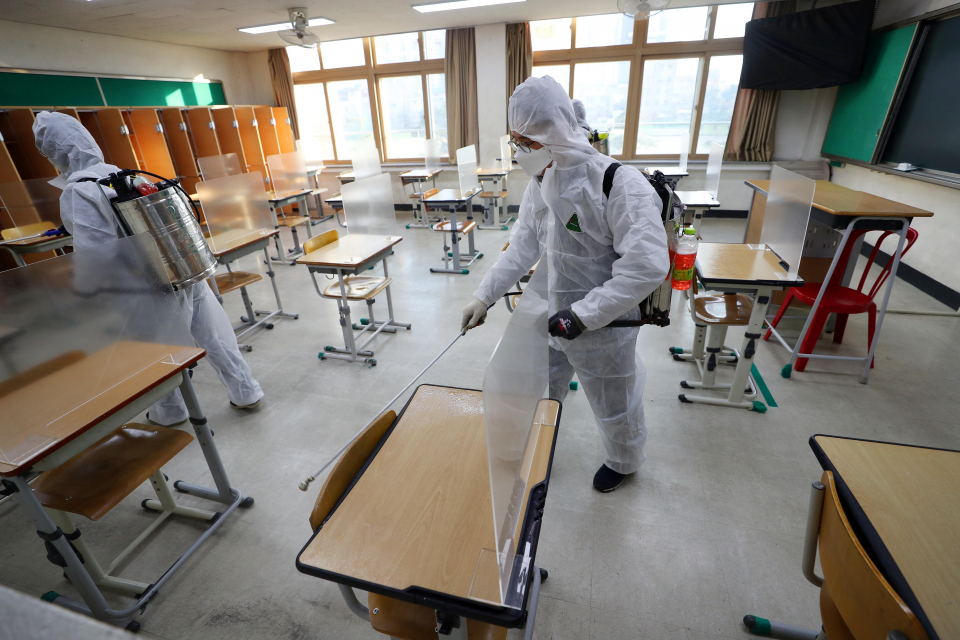 |
Health workers disinfect a school in the southeastern city of Daegu on Nov. 26, amid a resurgence of the coronavirus ahead of the national college entrance exam slated for Thursday. (Yonhap) |
South Koreans were on high alert Wednesday with only hours to go until hundreds of thousands of students would sit for the annual state college entrance exam amid the COVID-19 pandemic.
Around 490,000 high school seniors, graduates and others plan to take the College Scholastic Ability Test (CSAT) on Thursday amid a sharp increase in the number of coronavirus infections across the country.
That includes 37 coronavirus patients and 430 people in self-quarantine, according to Dec. 1 data from the education ministry. Hospital beds have been set up for up to 205 COVID-19 patients and special test centers for up to 3,775 people in self-quarantine.
Education authorities have said the exam will go ahead as planned with strict antivirus measures in place at 1,383 test centers and 31,291 classrooms nationwide. The CSAT was already postponed once from November.
"Beyond social distancing, our goal for this year's CSAT is to clearly distinguish between general test takers, those showing symptoms (of COVID-19), those in self-quarantine and patients, and then to completely separate their movements and take thorough antivirus measures at test centers to allow everyone to take the exam in a safe environment," a ministry official said.
The CSAT is the culmination of years of hard work for many students, and the government not only increases public transport to help students get to their test centers on time but also bans overhead flights during listening exams.
Test takers experiencing COVID-19 symptoms will be able to get tested for the virus until 10 p.m. Wednesday at designated public health centers. If the result comes back positive during the night, the student will still be able to take the exam at hospitals specializing in infectious diseases or other designated facilities.
All students will be required to wear a mask and get a temperature check before entering a test center. If an examiner asks to see the student's face for identification purposes, they will be required to briefly take down the mask and may face suspicions of cheating if they refuse.
During breaks, test takers will be asked to refrain from gathering and talking. They will also be required to bring a packed lunch to eat at their desks.
Water purifiers will not be installed at test centers as an antivirus precaution, and students will need to bring their own water.
Students are asked to dress appropriately to stay warm, as classrooms will be ventilated at the end of each session.
Under a two-week government campaign launched Nov. 19 to enhance antivirus measures ahead of the test, all high schools were required to conduct classes online starting Nov. 26, and all students were advised to stay home if possible and refrain from using crowded facilities.
With the increased number of test classrooms, the number of examiners and other staff on duty has also been increased by around 30 percent from last year to about 120,000.
Classroom capacity has been capped at 24 instead of 28, and each table has been fitted with a plastic divider as an added precaution.
An 18-year-old student living in Chuncheon, 85 kilometers northeast of Seoul, said he has been taking mock exams while wearing a mask to get used to the exam environment.
A mother in Osan, 55 km south of Seoul, said her entire family has been helping her son prepare for the exam by not going out if possible.
"We sometimes drove our son to a nearby beach so that he could get some fresh air because he's been staying home all day to prepare for the exam," she said. "We didn't leave the car and brought back take-out food to eat at home."
At a meeting with his aides on Monday, President Moon Jae-in called for all-out preparations for any eventuality during the course of the exam.
"The entire world is watching our CSAT," he said, noting that many advanced countries have either canceled or postponed national exams due to the virus.
"If at this difficult time South Korea can safely administer the CSAT even among those in self-quarantine and those who have tested positive, the excellence of 'K-quarantine' will shine further," he added, referring to the nation's aggressive response to the coronavirus pandemic.
Education Minister Yoo Eun-hae visited a high school in Chuncheon on Tuesday to check preparations in the region.
"We will prepare without the slightest oversight," she said.
Moon also visited a high school in Seoul on Sunday.
"Everyone at the education ministry is highly edgy because of COVID-19," a ministry official said. (Yonhap)





![[Weekender] Korea's traditional sauce culture gains global recognition](http://res.heraldm.com/phpwas/restmb_idxmake.php?idx=644&simg=/content/image/2024/11/21/20241121050153_0.jpg)


